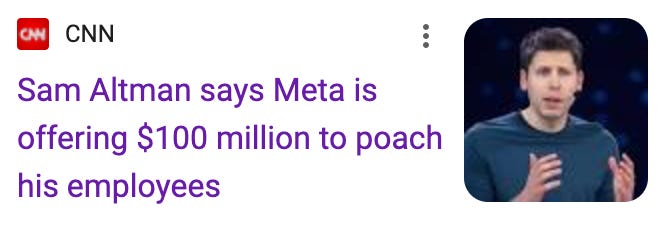Which Software Engineers will survive the AI Agentic Era?
For here, or to go?
AI doesn’t discriminate. It’s f**king everyone.
This time, even Software Engineers.
Yes, the prestigious ones who once felt secure in the past while other roles were eliminated due to macroeconomic conditions.
But what about those who’ve grown comfortable vibe coding with Copilot, Claude, or Cursor?
It’s good that they’ve adapted—but that’s no longer going to be enough.
Well, you still need someone to write long-term Software Vision. Roadmaps. Strategy docs. Right..?
Well, AGI has that covered too. The AI context windows are becoming practically infinite.
Hmmmm….Leaner teams? The new normal.
Layoffs…?
Well, unless you've been living under a rock, it's already happening. Here's what leaders at top companies are saying and doing:
Harsh... right?
Here’s the thing: It’s not new. Every technological revolution reshapes the job landscape.
Software engineering roles won’t vanish entirely.
But only a few archetypes will rise to the top.
That raises the next question:
When it's time to chop off the puff—
What decides if you're "for here or to go"?
Or put another way—
What are the archetypes that will survive?
👋 Hey there, I am Gourav. I write about Engineering, Thought Leadership, Human Psychology and the Mysteries of the mind!
Today, I am sharing an article in ‘Tech, AI & Leadership’ section of this newsletter.
It’s my prediction there are three archetypes of Software Engineers who will survive.
Archetype 1: Intraprenuers
Let’s understand these engineers via a true story about Mike (named changed to maintain anonymity):
A long time ago, I worked with Mike, a Product Manager at my former company.
Brilliant at his job. He wasn’t just obsessed with customers and products—he was obsessed with how engineers coded.
He had a software engineering background but had moved into product management.
Empathetic. Visionary. Business-minded. But...
He was limited by engineers because he hadn't coded in years.
He'd ping engineers daily:
"Can we build this?"
"How much effort?"
"When can we ship?"Engineers would scramble, estimate weeks, and deliver slowly.
He grew impatient.
With his engineering background, he understood concepts enough to dive into the codebase himself. He would question estimates, perform QA testing, and fix smaller bugs.
Crazy, right?
We joked:
“Mike could replace half of us—if only he knew coding better.”
Over time, he actually sharpened his technical skills and turned out to became a “Technical Product Owner”—a role specifically created for him.
Fast forward to today.
I truly believe people like Mike have a higher chance of thriving in the AI era.
As a leader, if given a choice between:
Someone who only codes,
Or someone who deeply understands customers, identifies problems, pitches solutions, rapidly prototypes, and leverages AI to build—
I’d always pick the latter.
Companies often assign prestigious labels to such people.
Some call them “those who think like owners.”
Others refer to them as the “CTO of their small teams.”
And some call them Intrapreneurs — “entrepreneurs within the company”.
covered this topic well in her latest article in The Pragmatic Engineer. (Must read!)These folks talk to customers, challenge the status quo, and understand that there’s a human on the other end of the product.
They possess strong interpersonal skills and deep empathy for their teammates and customers.
They bring in the deals. They create business.
They are the real leaders.
Archetype 2: AI Checkers
This type is relatively easier to understand.
They validate whether AI is doing its job well—similar to how senior engineers review the work of junior engineers. I simply call this archetype the AI Checkers.
These are exceptional Software Engineers who specialize in niche domains.
Think Infrastructure Architects.
Cybersecurity Networking Engineers.
Data Engineering and Security Experts.
Don’t get me wrong—AI will eventually make inroads here too.
But these areas are often deeply tied to company-specific systems and practices.
That’s exactly where human specialists will step in—to oversee how AI agents operate and identify when they fall short or go off track, and course correct.
Archetype 3: AI Builders
This one is even easier to grasp, especially if you’ve been following what’s happening in the industry right now.
I call this final archetype the AI Builders.
These are the engineers building the foundation of the AI era.
They train large models, fine-tune them post-deployment, and stitch together multi-agent workflows that resemble mini-AI companies.
They don’t just adapt to AI tools—they build them.
They don’t just automate tasks—they create the automation.
These engineers will not only become essential—they’ll become elite.
The top 0.1%.
Highest paid. Most in-demand. Courted by everyone.
Meta, for example, is already poaching OpenAI engineers with multi-million packages.
Companies are forming entire divisions just to attract and retain these folks.
Closing Thoughts
You’ll need to fall into one of these three archetypes to stay relevant in this new era.
Now is the time to reflect.
Figure out what aligns with your strengths, passion, lifestyle, and personal goals.
Do you enjoy building things from scratch? You might be a future AI Builder.
Do you love working with customers and solving business problems? You might be an Intrapreneur.
Do you have deep expertise in systems or infra? You could thrive as an AI Checker.
There’s no one-size-fits-all answer here. But there is a path for those willing to adapt.
What exactly should you start doing today?
That’s a whole article in itself—and maybe, just maybe, I’ll write that next.
🤝 Let’s Connect
Sponsorship | Collaboration | LinkedIn | 1:1 Mentoring | Twitter
Gourav Khanijoe




Seriously, what exactly should I start doing today?